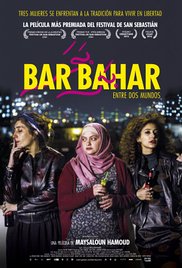For once the English translation of the Hebrew title of this film was quite inspired. In Hebrew it was screened as ‘lo po, lo sham’ (not here, not there) and ‘In Between’ reflects even better the state of mind but also the social status of the three heroins of this interesting film. It also is quite a rare (but not unique) production in the local film market, a film about the Palestinian Arabs in Israel, spoken almost entirely in Arab, dealing with the tensions and problems in the society and communities of the Arabs living in Israel. I need to mention also that the film was produced by Shlomi Elkabetz and is dedicated to the memory of his late sister Ronit Elkabetz, a wonderful actress and film-maker who passed away a year ago, and supported financially by several Israeli film funds and TV stations.
The three Arab young women in the center of the film live in the cosmopolitan city of Tel Aviv, a city which is liberal and permissive by any criteria. In Israel it is sometimes called ‘The Bubble’ because of the differences in style of life from the rest of the country – the gape between living in Tel Aviv and the rest of Israel is as large as the gape between living in Manhattan and the rest of the US, or Paris and the rest of France. These differences are even more accentuated for people coming from the Arab sectors society (which are much more traditional than the Jewish ones) and even sharper for women. Leila (Mouna Hawa), Salma (Sana Jammelieh), and Nour (Shaden Kanboura) have each a different life story, try to cope differently with the social, professional, genre, and emotional problems, but at the end will share the same fate of being pushed aside and discriminated for several reasons – belonging to the Arab minority, being women, trying to adopt a style of life and exercise professions, making their own choices in the personal lives.
Such stories cannot have a happy end, and the final scene is almost a freeze-up on desperation, although we know that their fight continues. I liked the solidarity of the three women, the direct, almost rough way their stories are told, the way the three actress enter or better say live in their roles. I liked less the schematic approach of presenting the other characters, bad (mostly) or good. Script author and director Maysaloun Hamoud seems to have borrowed many of the stereotypes of the Israeli films, and his approach in describing the Arab families as super-conservative and the Big City as a living hell populated with smoking, drinking, and drugs misses many other aspects of these complex worlds and situations even if it can be statistically close to reality. In Between could have been a much better movie in my opinion if these over-simplifications were avoided.

